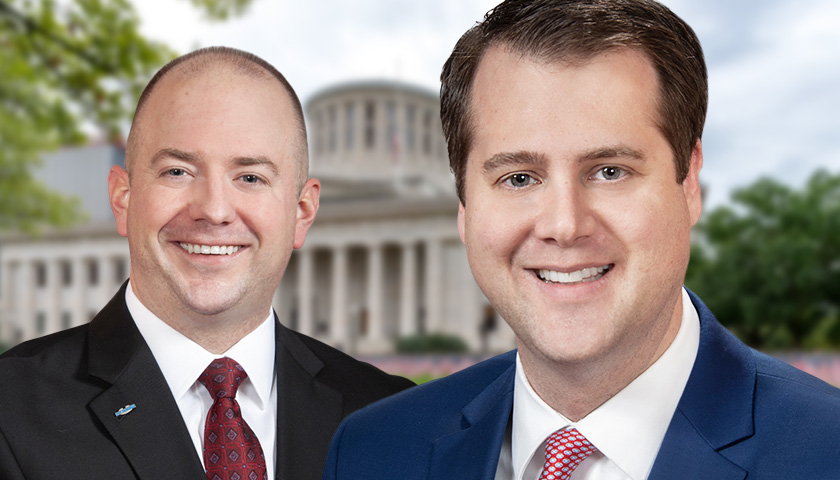Following a closed-door meeting at the Ohio Statehouse held by State Representative Derek Merrin (R-Monclova), a group of over 30 lawmakers filed a new version of their proposal to increase the threshold for citizen-led ballot initiatives.
Forty-seven Republicans who adhered to the Republican caucus’ decision to abstain from voting for State Representative Jason Stephens (R-Kitts Hill) for Speaker of the House were invited by Merrin to a meeting on Wednesday. The meeting included discussing house rules, redistricting, and progressing the proposed constitutional amendment to require support from at least 60 percent of voters rather than a simple majority to pass future proposed amendments that lawmakers introduced last legislative session.
State Representative Brian Stewart (R-Ashville) introduced House Joint Resolution (HJR) 6, also known as the “Ohio Constitution Protection Amendment,” in November; however, the legislation did not pass before the end of the session. Stewart indicated at the end of the year that he intended to resurrect the legislation in the 135th General Assembly.
“Our Founding Fathers ensured that the United States Constitution would be protected against outside influence and special interests by requiring a supermajority vote for amendments. We can and should protect the Ohio Constitution in a similar way,” Stewart said.
On Wednesday, Stewart and Merrin and 30-plus GOP co-sponsors re-submitted the amendment but with two substantive changes from the prior version.
Instead of just 44 counties, the revised version would require signatures from all 88 as well as they eliminated the cure period for constitutional amendments, which allows citizen-led organizations to gather additional signatures if their initial batch doesn’t meet the requirements to make the ballot.
“When we talk about changing our Constitution, we need to make sure it has widespread support from all corners of the state,” Stewart said.
Ohio Secretary of State Frank LaRose previously vocalized his support of the legislation and has recently noted that he is not done seeking changes.
“The amendment kicked off a very important and long overdue discussion about how to protect Ohio’s constitution from special interests. There are many voices at the table who are part of this discussion and the dialogue is ongoing,” Rob Nichols spokesman for LaRose told The Ohio Star.
LaRose, who introduced the proposal with Stewart last November, repeated a previous defense of their position.
“The Ohio Constitution is supposed to serve as a framework of our state government, not as a tool for special interests. Requiring a broad consensus majority of at least 60 percent for passing a petition-based constitutional amendment provides a good government solution to promote compromise and to have a historically proven record of passage,” LaRose said.
Shortly before HJR 6 stalled, Stewart sent a letter to GOP members urging them to back the proposal.
“Too much is at stake we must take this opportunity to protect Ohio’s Constitution. If we cannot pass HJR now, I hope you will seriously consider the consequences of inaction and support this resolution in January as we begin the 135th General Assembly,” Stewart wrote.
Opponents such as the League of Women Voters of Ohio promise a fight.
“For over a century, everyday Ohioans have had the freedom to collect signatures and pass ballot initiatives that make our lives better. This resolution is unnecessary, unpopular, and undemocratic, and our broad coalition of nearly 200 organizations stands ready to defeat it,” Jen Miller, executive director of the League of Women Voters of Ohio told The Star.
Democrat House Leader Allison Russo (D-Upper Arlington) has also acknowledged that in speaking with both Merrin and Stephens, the proposed amendment threshold change was something she was concerned about.
She avoided specifically addressing whether she had struck an agreement with Stephens to kill any upcoming proposals.
Initially, Stewart intended to have the issue on the May ballot. Legislators would need to approve the resolution by February 1st in order for that to happen.
Despite leadership still figuring out committee membership Stewart says there is ample time to get the legislation moving.
“I introduced the Ohio Constitution Protection Amendment with 21 days to spare before the February 1 deadline to make the May 2023 ballot. After today there will be 20 days left. The clock is ticking, and we’re ready to work,” Stewart said.
In order for Stewart to get his resolution on the ballot, three-fifths of the members in both chambers have to approve the resolution first. In the House, that’s 60 votes. 45 Republicans voted for Merrin in the speaker’s race, and 38 participated in Wednesday’s caucus meeting with several of them over the phone.
– – –
Hannah Poling is a lead reporter at The Ohio Star and The Star News Network. Follow Hannah on Twitter @HannahPoling1. Email tips to [email protected]
Photo “Derek Merrin” by The Ohio House of Representatives. Photo “Brian Stewart” by The Ohio House of Representatives. Background Photo “Ohio Statehouse” by Sixflashphoto. CC BY-SA 4.0.







